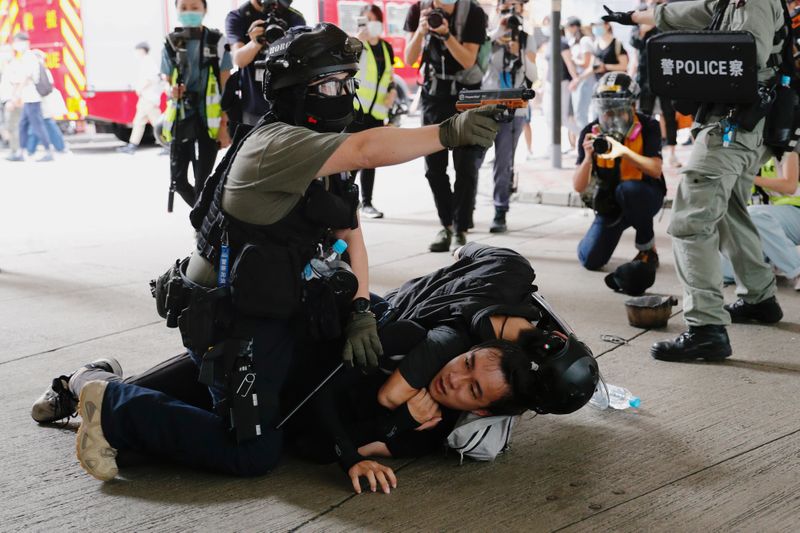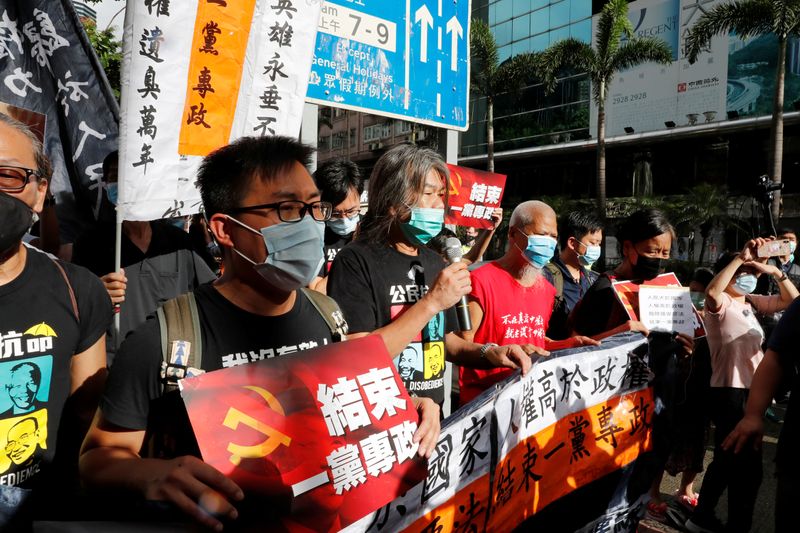By Scott Murdoch and Yanni Chow
HONG KONG (Reuters) - Hong Kong police fired water cannon and tear gas and arrested nearly 200 people on Wednesday as protesters took to the streets in defiance of sweeping security legislation introduced by China that critics say is aimed at snuffing out dissent.
Beijing unveiled the details of the much-anticipated law late on Tuesday after weeks of uncertainty, pushing China's freest city and one of the world's most glittering financial hubs onto a more authoritarian path.
As thousands of protesters gathered downtown for an annual rally marking the anniversary of the former British colony's handover to China in 1997, riot police used pepper spray and fired pellets as they made arrests after crowds spilled into the streets chanting "resist till the end" and "Hong Kong independence".
"I’m scared of going to jail but for justice I have to come out today, I have to stand up," said one 35-year-old man who gave his name as Seth.
The new law will punish crimes of secession, subversion, terrorism and collusion with foreign forces with up to life in prison, will see mainland security agencies in Hong Kong for the first time and allow for extradition to the mainland for trial.
China's parliament adopted it in response to protests last year triggered by fears that Beijing was stifling the city's freedoms, guaranteed by a "one country, two systems" formula agreed when it returned to Chinese rule.
Earlier on Wednesday, police cited the law for the first time in confronting protesters.
"You are displaying flags or banners/chanting slogans/or conducting yourselves with an intent such as secession or subversion, which may constitute offences under the ... national security law," police said in a message displayed on a purple banner.
Authorities in Beijing and Hong Kong have repeatedly said the legislation is aimed at a few "troublemakers" and will not affect rights and freedoms, nor investor interests.
But critics fear it is aimed ending the pro-democracy opposition and will crush the freedoms that are seen as key to Hong Kong's success as a financial centre.
The United States and its Asian and Western allies have criticised the legislation.
Police fired water cannon to try to disperse the protesters and said they had made more than 180 arrests for illegal assembly and other offences, with some involving violations of the new law.
A game of cat-and-mouse reminiscent of last year's often violent demonstrations followed, with protesters blocking roads before running away from riot police charging with batons, only to re-emerge elsewhere.
Police posted pictures on Twitter of an officer with a bleeding arm saying he was stabbed by "rioters holding sharp objects." The suspects fled while bystanders offered no help, police said.
On July 1 last year, hundreds of protesters stormed and vandalised the city's legislature to protest against a bill that would have allowed extraditions to mainland China.
Those protests evolved into calls for greater democracy, paralysing parts of the city and paving the way for Beijing's new law.
'BIRTHDAY GIFT'
In Beijing, Zhang Xiaoming, executive deputy director of Beijing's Hong Kong and Macau Affairs Office, told reporters suspects arrested by a new Beijing-run security office could be tried on the mainland.
He said the new office abided by Chinese law and that Hong Kong's legal system could not be expected to implement the laws of the mainland. Article 55 of the law states that Beijing's security office in Hong Kong could exercise jurisdiction over "complex" or "serious" cases.
"The law is a birthday gift to (Hong Kong) and will show its precious value in the future," Zhang said, adding the law would not be applied retroactively.
(For highlights of the law, click)
Speaking at a flag-raising ceremony to mark the handover anniversary, the city's Beijing-backed leader, Carrie Lam, said the law was the most important development since the city's return to Chinese rule.
"It is also an inevitable and prompt decision to restore stability," Lam said at the harbour-front venue where 23 years ago the last colonial governor, Chris Patten, a staunch critic of the security law, tearfully handed back Hong Kong to Chinese rule.
Some pro-Beijing officials and political commentators say the law is aimed at sealing Hong Kong's "second return" to the motherland after the first failed to bring residents to heel.
Luo Huining, the head of Beijing's top representative office in Hong Kong, said at the ceremony the law was a "common aspiration" of Hong Kong citizens.
Some pro-democracy activists gave up membership of their groups just before the law came into force into force at 11 p.m. (1500 GMT) on Tuesday, though they called for the campaign to go on from abroad.

"I saw this morning there are celebrations for Hong Kong's handover, but to me it is a funeral, a funeral for 'one country two systems'," said pro-democracy lawmaker Kwok Ka-ki.
